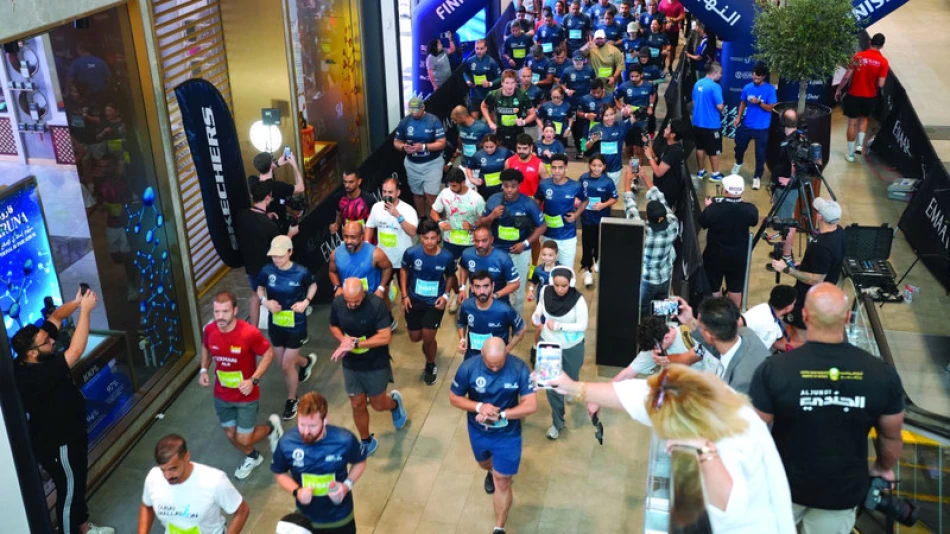
Dubai Mawlana: World's Largest Indoor Marathon Event Enters Guinness World Records
Dubai's Mall Marathon Sets World Record as Gulf States Pioneer Indoor Fitness Revolution
Dubai has achieved a Guinness World Record for the largest shopping mall running event, drawing over 40,000 participants across nine malls in a month-long community fitness initiative. The "Dubai Mollathon," sponsored by Crown Prince Sheikh Hamdan bin Mohammed, signals the UAE's broader strategy to integrate wellness into urban lifestyle while positioning Dubai as a global hub for innovative sports events.
Record-Breaking Community Engagement
The initiative concluded with a spectacular finale at Dubai Hills Mall, where 1,392 participants from diverse nationalities and age groups secured the Guinness World Record for the largest indoor mall running race. Over 31 days, participants collectively logged more than 120 million steps across climate-controlled indoor tracks spanning over 10 kilometers in total distance.
The final marathon event saw Victor Kiprono claim first place, followed by Godfrey Sigoli in second, with Rio Watson—a person of determination—finishing third, highlighting the inclusive nature of Dubai's sports vision.
Strategic Vision Behind the Initiative
Dr. Sultan Al Neyadi, Minister of State for Youth Affairs, emphasized that the massive youth participation demonstrates how sports serve as "the real outlet for them, and the best way to channel energy positively." This aligns with the UAE's broader "Year of Community" objectives and Dubai's Social Agenda 33, which targets building a healthier, more cohesive society by 2033.
The initiative operated daily from 7:00-10:00 AM across major venues including Dubai Mall, Mall of the Emirates, and Dubai Marina Mall, making fitness accessible during cooler morning hours—a crucial consideration in the Gulf's climate.
Regional Context and Innovation
Dubai's mall marathon concept represents a uniquely Gulf approach to urban wellness, addressing the region's extreme summer temperatures that often limit outdoor activities. Unlike Singapore's park connector networks or New York's High Line, Dubai has innovated by transforming commercial spaces into fitness venues.
This strategy mirrors broader Gulf trends where climate-controlled environments become essential for year-round community activities. The UAE's investment in indoor sports infrastructure has previously included the world's largest indoor ski resort and numerous climate-controlled sports facilities.
Government and Private Sector Alignment
The initiative saw unprecedented cross-sector participation, with Dubai Police, Roads and Transport Authority, Dubai Economy and Tourism, and multiple emirate youth councils joining the effort. This coordination reflects the UAE's systematic approach to implementing national wellness strategies through public-private partnerships.
Khalfan Belhoul, Deputy Chairman of Dubai Sports Council, noted that such initiatives position Dubai as "a global capital for community sports and a premier destination for organizing innovative events."
Implications for Urban Planning and Wellness Tourism
The success of Dubai's mall-based fitness initiative offers a replicable model for other hot-climate cities globally. By converting existing commercial infrastructure into wellness spaces, cities can maximize utility while promoting public health without significant additional investment.
For Dubai's tourism sector, this positions the emirate as a destination where visitors can maintain fitness routines regardless of weather conditions—a competitive advantage over traditional beach or outdoor-focused destinations during summer months.
Looking Forward: Scaling Community Wellness
The record-breaking participation suggests strong appetite for accessible, community-based fitness programs in the Gulf region. With Dubai targeting enhanced quality of life by 2033, such initiatives likely represent pilot programs for larger-scale urban wellness integration.
The involvement of youth councils from all seven emirates indicates potential for UAE-wide expansion, possibly establishing a new category of climate-adapted community sports that other Gulf Cooperation Council nations may adopt.
Most Viewed News

 Sara Khaled
Sara Khaled






